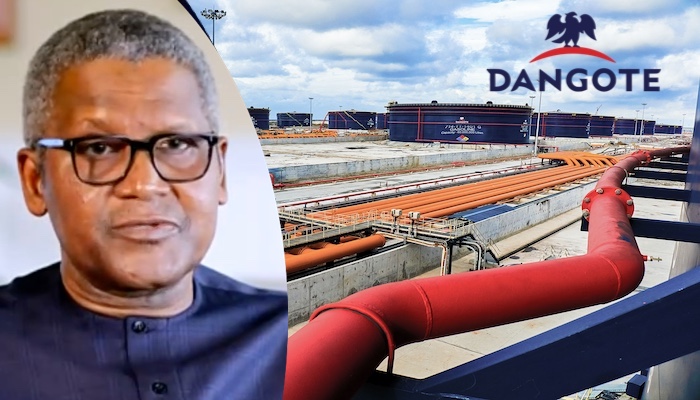You Can’t Force Us To Sell Crude To Dangote Refinery – Producers To FG

Oil producers, under the aegis of the Independent Petroleum Producers Group, have disclosed that they will not be forced to sell crude oil to the Dangote Petroleum Refinery and other local ones in Nigeria.
This was as they called on the Nigerian National Petroleum Company Limited to re-direct its allocated crude oil volumes to Dangote refinery and other local refineries to mitigate the current crude supply shortage being experienced by the local refiners that is impacting local product availability in many parts of Nigeria.
According to the Nigerian Upstream Petroleum Regulatory Commission, IPPG produces about 30 per cent of Nigeria’s crude oil.
IPPG made this known in a letter by its chairman, Abdulrazak Isa, dated August 16, 2024 and addressed to the Chief Executive of the Nigerian Upstream Petroleum Regulatory Commission, Gbenga Komolafe.
The letter urged NNPC to utilise its allocated 445,000 barrels per day intervention crude oil volume to salvage the current situation as it did in many instances in the past.
Isa said some IPPG members already owned and/or were supplying crude oil to local refineries.
He insisted that NNPC was in a good position to mitigate the current crude supply shortfall faced by local refiners by leveraging its statutory crude allocation to meet local domestic consumption.
“Historically, NNPC has always had an intervention crude oil volume (445,000bpd) meant to satisfy the nation’s domestic consumption. This volume has always been used under various swap mechanisms to import refined products for domestic consumption.
“Since there is now domestic refining capacity to meet consumption, this dedicated volume should be reserved for all domestic refineries under a price hedge mechanism that can be provided by a suitable financial institution such as Afrexim Bank,’’ he stated.
Isa, however, maintained that “Any national production above this allocated volume should be treated strictly as export volumes, adhering to the willing-buyer, willing-seller framework of the international market especially since the refiners will need to export excess products that surpass domestic demand, thus boosting FX (foreign exchange) earnings.’’
The group expressed concerns over certain recent developments, including the domestic crude oil refining requirements and crude oil production forecast for the second half of 2024, announced by NUPRC, as well as the request to all producing companies for their monthly quotations for crude oil supply to licensed refineries in Nigeria.
Specifically, IPPG said some of its members had received letters from the Dangote Refinery for crude supply nominations for October, and faulted the approach as bringing them under an obligation, saying it conflicted with the spirit of the willing-buyer, willing-seller framework prescribed by the Petroleum Industry Act 2021.
He asserted that the objective of enhancing the country’s petroleum value chain should be done within the confines of the law and existing obligations.
He expressed confidence that an amicable solution could be reached by all stakeholders without jeopardising the existing commercial agreements, economic interests, and business models of each segment of the oil and gas sector.
“While we fully support and commend the efforts of Nigerian entrepreneurs to enhance domestic refining capacity, it is important that no private sector business is unduly pressured into arrangements that may effectively subsidise another within the oil and gas value chain under any guise whatsoever.
“Under this willing-buyer, willing-seller framework, it is essential for refiners to negotiate and execute long-term crude oil Sales and Purchase Agreements with producers and their marketing agents. These agreements should follow industry best practices, with typical tenures ranging from one to five years,’’ the IPPG chairman said.
READ ALSO
●NLC Boss, Ajaero Declines Police Invitation
●FG Sets Up Committee To Enforce LG Autonomy
He added that some of them had also received allocation letters from NUPRC for the supply of specific volumes of crude oil to the domestic market for the second half of 2024, expressing concerns about its potential implications for the economy, especially the foreign exchange earnings through royalties and taxes.
The group noted, “We understand that the current allocation methodology appears to be based on a matrix of production forecasts by producers, issued technical allowable rates as well as crude oil requirements of domestic refineries, rather than actual local consumption needs. This raises significant concerns as it suggests that allocations are being determined based on the demands of refiners, which may exceed what is needed for domestic consumption.
“Such an approach could lead to inefficiencies and unfairly disadvantage producers. Therefore, refineries with excess capacity beyond local consumption mustn’t exploit the Domestic Crude Oil Supply Obligations to the detriment of oil producers and other stakeholders, including the Government.’’

Kazeem Badmus is a graduate of Mass Communication with years of experience. A professional in journalism and media writing, Kazeem prioritses accuracy and factual reportage of issues. He is also a dexterous finder of the truth with conscious delivery of unbiased and development oriented stories.









